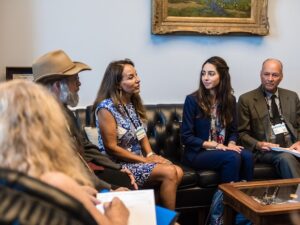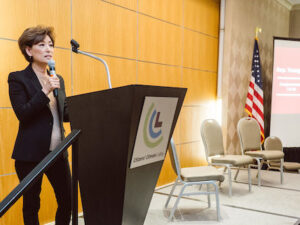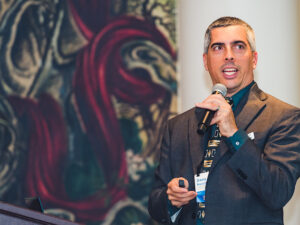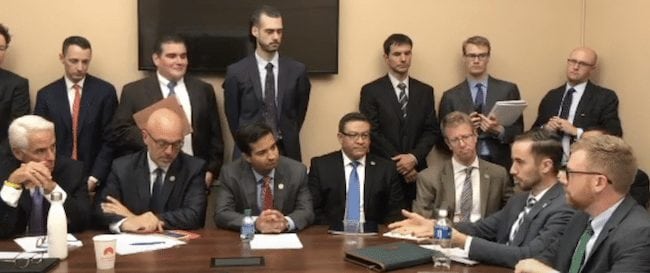
A snapshot from the September 13 meeting of the Climate Solutions Caucus
Climate Caucus weighs in on disasters, hears about impact of climate change on tourism
By Flannery Winchester
At a meeting to discuss the impact of climate change on tourism, Republican Rep. Carlos Curbelo, co-chair of the bipartisan House Climate Solutions Caucus, weighed in on Hurricane Irma, which decimated the Florida Keys that he represents.
“There were hurricanes before human-induced climate change—we should not blame every hurricane on climate change. However, climate change without question contributes to the strength and to the factors that lead to these events. This storm was one of the largest and one of the strongest in the history of the Atlantic basin… certainly, [climate change] is a factor in the strength of these hurricanes.”
His remarks opened a meeting of the Climate Solutions Caucus Wednesday where members heard from athletes and outdoor industry representatives about the economic toll that climate change is having on winter sports and other recreational activity.
Setting the stage
Rep. Curbelo began by acknowledging, “I don’t know if the timing of this meeting is perfect or terrible.” He was referring, of course, to record-breaking Hurricane Irma. He noted the eight casualties that have been reported so far, and asked that everyone keep those impacted in their thoughts and prayers.
Rep. Deutch set the stage for the day’s discussion by saying, “We’ve seen, over the last few weeks, the country hit by several large natural disasters. Obviously Hurricane Harvey inundated Houston and the Texas coast with more than 50 inches of rain. Montana is experiencing one of the largest droughts in the state’s history. Wildfires have consumed areas there and surrounding Los Angeles.” Here, Rep. Deutch was gently interrupted by a few of his colleagues piping up to say that Oregon, Utah and many other areas are also being affected by the wildfires. “Okay, every part of the country,” Rep. Deutch amended, “which is exactly the point!”
He continued, adding Hurricane Irma to the list of recent climate-fueled disasters. Rep. Deutch said, “I want to commend our governor, Rick Scott, for doing an exceptional job in helping to protect life and property in the state from the deadly winds of Hurricane Irma. I would also say, however, that we have to be prepared to confront what climate change has wrought. We can’t do that unless we acknowledge the cause.”
Rep. Deutch then gave a quick rundown of exactly why these extreme weather events have been so intense: warmer ocean waters and warmer air have strengthened hurricanes, and changing weather patterns have resulted in the enormous wildfires we now see across the west. He also echoed Miami’s Republican mayor Tomás Regalado, who said last week, “This is the time to talk about climate change.” Rep. Deutch invited Governor Scott to join the kind of open, solution-focused discussion that the 56-member Climate Solutions Caucus is having together.
Rep. Curbelo again acknowledged those who had been impacted by the storm. “We’re very sensitive to those who are trying to recover. We want to do everything we can to improve this situation in the future, or at least to prevent it from getting worse.”
Finding connections
The meeting then moved to a quick round of introductions, during which 10 other caucus members voiced their districts’ connections to the outdoor industry and their concerns about climate change’s impacts at home.
Republican Rep. Mia Love from Utah said, “My heart and prayers go out to all of those affected. I have a lot of family members in Florida, in the Miami area. And this is something that doesn’t just affect Floridians—it affects everyone.” She referenced the wildfires impacting her district, saying, “We’re all in this together.”
Rep. Suzanne Bonamici, a Democrat who represents the Northwest part of Oregon, noted the wildfires that are affecting air quality in her district, too. She also said tourism and recreational activities are a big part of the district she represents, mentioning Nike and Columbia Sportswear, who “can’t sell a lot of winter coats if there isn’t a winter.”
Three Democrats from California were in attendance, Rep. Salud Carbajal, Rep. Alan Lowenthal and Rep. Jimmy Panetta, who thanked Rep. Deutch and Rep. Curbelo for their leadership on climate issues.
Minnesota Democrat Rep. Rick Nolan said he was proud to represent his area, which includes several national parks and the city of Duluth, which Discover Magazine ranked as the number one outdoor city in America.
Republican Rep. Dave Joyce from Ohio mentioned preserving the Great Lakes. “They’re not just lakes—I view them as national treasures,” he said.
Republican Rep. Ryan Costello from Pennsylvania, who is also a member of the Energy and Commerce Committee, commented on the impressive size of the caucus, which has reached 56 members. “We should all be proud that we are now too big a group to meet in this small room,” he joked.
Rep. Derek Kilmer, a Democrat from Washington, brought up the wildfires in his district, as well as the threat of sea level rise. “I represent 11 Native American tribes, four of which are trying to move to higher ground,” he said.
Rep. Mia Love joined in again to give some props to Utah and to the caucus. “I’m going to try to get as many people on this caucus as possible because it affects Utah, our ski industry and our outdoor industry.”
Later, Rep. Charlie Crist arrived at the meeting and said, “We are seeing climate change’s effects up close and personal in the Sunshine State right now.”
It’s clear from these introductions, there’s common desire across the country—and across parties—to protect and preserve our natural world. With everybody on the same page, the caucus turned the floor over to their five impressive guests to discuss the climate impacts they and their industries are experiencing.
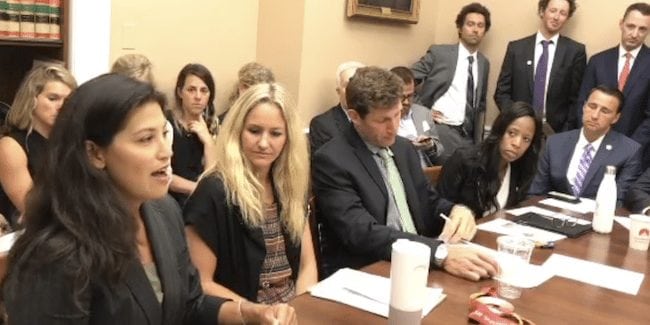
(L-R) Hilary Hutcheson, Gretchen Bleiler and Auden Schendler gave moving testimonies to the Climate Solutions Caucus. Rep. Mia Love and many fellow caucus members listened intently.
Snowfall and skiing
Gretchen Bleiler, an Olympic snowboarder and member of Protect Our Winters, kicked things off with a focus on snow sports. She emphasized the economic benefits of her industry, which generates $7.2 billion and supports 695,000 jobs. “Climate change is threatening the future of that economic engine. Snow pack is being confined to the higher elevations, winters are getting shorter, and what should be falling as snow is actually falling as rain,” she explained.
She also pointed out that huge competition events, such as this year’s World Cup and the Dew Tour, had to be cancelled because of lack of snow in Colorado. Those events can easily inject $6 million into the local economy in just one weekend—but not if climate change continues to affect snowfall.
Auden Schendler, the Vice President of Sustainability at the Aspen Skiing Company, also spoke. He, like Bleiler, is involved with Protect Our Winters and wanted to acknowledge the economic power of the ski industry. His company employs 4,000 people and has ski resorts across many states. “This is a huge chunk of the economy. This is employment,” he said. “There are more ski jobs in Colorado than coal mining jobs in the United States.”
But because of climate change’s impact on snowfall, Schendler’s company is forced to think of ways to diversify their business model. They’ve begun developing mountain biking trails—but even those are unusable right now, due to the smoke from wildfires. He suggested that legislators consider a carbon tax, a solution he said “the right can support.” He concluded his remarks by reminding them, “It is so wonderful and inspirational that you are all here, but we need action.”
Fishing and birding
Hilary Hutcheson, a professional fly fisherman, gave an impassioned testimony about how wildfires, heat, and drought are affecting the fly fishing industry in Montana. “Year over year, we’re experiencing a shut down in prime fly fishing season,” she explained, resulting in a 50% reduction in business. Why? “It’s too hot, it’s too dry, and the river is too low for the fish to thrive. We’ve been seeing this consistently year after year after year. Next year won’t be better—it will be the same or worse,” she said. And in fact, the only reason Hutcheson was able to attend this meeting in person is because her fly shop is currently closed because of the wildfires, which she noted are covering more acreage and burning hotter than they used to.
Hutcheson’s already feeling the economic effects of the struggling industry. She’s a single mom of two teenage girls, and she said, “The money I personally have lost from the fires is a winter’s worth of groceries.” And it’s not just her—it’s the whole community. She cautioned that as climate change continues and the glaciers melt away, “Our stores will shut down, the restaurants will close, hotels will close, families will move, and communities will die.”
Mike Leonard, the Conservation Director for the American Sportfishing Association, put a particular emphasis on the ways climate change impacts fish populations, and what that means for the $115-billion-per-year fishing industry. “The impacts of climate change are real and significant,” he began. He touched on how warming water temperatures are shifting the traditional ranges of many fish species, which creates management and resource challenges. He also brought up ocean acidification, which affects coral reef health. When fish habitats are affected in these ways, that impacts everything from the fish themselves down to restaurants, hotels and other businesses that depend on healthy, thriving fish populations.
He also commended the caucus for including the word “solutions” in their name. “I think that’s the key term. There’s so much rhetoric, but to try and get past that and focus on solutions—that’s really important.”
Justin Stokes, Director of Legislative Affairs from the National Audubon Society, spoke last. The National Audubon Society has more than 1 million members and 450 chapters, as well as annual, distributed events such as the Christmas Day Bird Count. Each year for that event, more than 70,000 Americans around the country record the birds they see in their yards and their communities, and report that data to the National Audubon Society. “We are able to determine that winter birds in North America are spending their winters farther north than they were in 1960,” Stokes said. They compiled and published a report on this data, which shows climate change’s impacts on birds. “We know that it’s real,” Stokes said.
Millions of Americans participate in bird observation each year, and they spent $75 billion last year on things like trips, equipment, bird food and bird feeders. As birds struggle with breeding challenges, food scarcity and more due to climate change, this area of the economy will struggle too.
The final word
The representatives were clearly moved by these personal testimonies and the huge economic price tags attached to them. Rep. Curbelo, Rep. Deutch and Rep. Love all asked follow-up questions to their guests and thanked them for attending. Rep. Deutch said, “I’m really grateful for everyone being here. It’s a vitally important conversation, and your advocacy, I hope, will propel us forward.”
In closing, Rep. Love said, “We have to stop pretending that something isn’t wrong. We all are part of the problem, which means we all have to be part of the solution.”

